#Venezuelan government
Text
.
This year is an election year for Venezuela ,,,, and I can't help but feel like something is gonna go wrong again
#Meitoswords#I don't like to talk about the situation in Venezuela too much#Most people in the country have started doing their own shit while the government makes everything worst#But damm I really have a bad feeling for this year's “election”#I am desperate for things to get better tho#The more were stuck in this situation with this government the longer it will take us to rebuilt ourselves#Like even if the “”bad guys“” (we know who) get “defeated” the effects are ever lasting#The only way to end this is sanctions or killing we know who/j#Well only half jk#Tbh sanctions are sorta shit. I do think they were implemented thinking of the best case scenario but they've only left us more isolated an#Fucked venezuelans over even more#Without touching the government#I wish I could explain what it feels like for your country to be so isolated but I can't#It's weird idk#It feels like I'm talking about a completely different univers to everyone else#I must keep my hope up but#I'm scared#Even when I've spent most of my life outside from the country I'm scared#Idk why I'm posting this not like this is gonna help lol#We'll see#Vent
0 notes
Text
UK to send naval ship to Guyana amid border dispute with Venezuela
The UK Navy will send a patrol ship to Guyana as a sign of British support for the Commonwealth country.
The South American country is in a dispute with Venezuela over a mineral-rich border area. HMS Trent will take part in joint exercises with Guyana after Christmas. A Ministry of Defence spokesman said:
HMS Trent will visit regional ally and Commonwealth partner Guyana later this month as part of a series of engagements in the region during her Atlantic patrol task deployment.
The dispute erupted after the discovery of oil in Guyana and escalated when Venezuela voted in a referendum on 3 December to claim two-thirds of its smaller neighbour’s territory.
Read more HERE
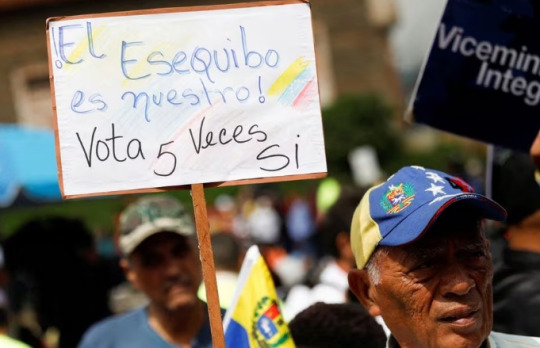
#world news#world politics#news#uk politics#uk news#uk government#england#united kingdom#great britain#uk military#navy#venezuelans#venezuela#essequibo#esequibo#guayana esequiba#guyana
0 notes
Text
Trust in Venezuela: A Historical Analysis of Eroded Trust and Its Impact on Society
Trust in Venezuela: A Fragile History of Erosion and Crisis
Trust is a fundamental aspect of any society, serving as the foundation for social, economic, and political interactions. In Venezuela, however, trust has been an elusive and fragile concept throughout its history. The country has experienced a tumultuous journey, characterized by political instability, economic crises, and social…

View On WordPress
#Authoritarian rule#Corruption in government#Economic instability#Historical analysis#Human rights violations#Oil boom and bust#Political polarisation#Social unrest#Trust in Venezuela#Venezuelan politics
0 notes
Text

Pakistan:
Strongly condemning Israel's assault on the city of Rafah in the southern Gaza Strip, Pakistan said Monday that Tel Aviv is in violation of measures ordered by the UN's top court last month.
The Maldives:
The Maldives on Monday also strongly condemned Israel's "threats to launch a full-scale invasion" on Rafah city.
"The forced displacement and inhumane attacks against innocent Palestinians and the obstruction of humanitarian assistance by the Israeli occupation forces is against international laws and regulations and tantamount to war crimes," the said a Foreign Ministry statement from the capital Male.
Afghanistan:
The interim Taliban administration in Afghanistan also joined the chorus against the Israeli attacks on Rafah.
"The continuation of brutality of Zionist forces on Rafah city will cause a major disaster and make the ongoing crisis spiral out," the Foreign Ministry in Kabul said.
China:
China’s Foreign Ministry spokesperson said that Israel’s actions in Rafah harm civilians and violate international law. China opposed and condemned Israel’s Rafah actions and it is closely following the developments in the Rafah area. It further urged Israel to stop its military operation as soon as possible and warned of a ‘serious humanitarian disaster’ if Israel continues its ground offensive in Rafah.
Venezuela:
In a statement, the Venezuelan Foreign Affairs Ministry condemned "the actions taken by the Government of Israel within the framework of the expansion of the military offensive in the Gaza Strip toward Rafah, in the far south.
"The statement added that this "Israeli Zionist plan aims to continue implementing its criminal and expansionist policy in this area that is home to more than one million four hundred thousand displaced Palestinians."
#yemen#jerusalem#tel aviv#current events#palestine#free palestine#gaza#free gaza#news on gaza#palestine news#news update#war news#war on gaza#rafah#rafah under attack#genocide#gaza genocide
692 notes
·
View notes
Photo

The Brazilian Armed Forces have reportedly been placed into a Heightened State of Readiness due to a Significant Movement of Military Equipment and Personnel in Eastern Venezuela
Officials believing that Venezuela may soon Invade the Small South American Country in order to Annex the “Guayana Esequiba” Region which accounts for over 60% of the Nation’s Territory and has been Claimed by the Venezuelan Government.
by sentdefender
239 notes
·
View notes
Text

"The Government of the Bolivarian Republic of Venezuela expresses its profound concern over the evolution of recent events in the Gaza Strip, while recognizing that the escalation is the result of the impossibility the Palestinian people face in finding a place within multilateral international law to assert their historical rights.
The Venezuelan Government advocates for a swift solution to the urgent situation of hostility and confrontation and for an end to violence in all Palestinian territory through direct dialogue and the fulfillment of United Nations Security Council Resolution 2334, which requires Israel to put an "immediate and complete" end to all settlement and occupation activities on Palestinian land, as the only road to peace.
The Government of the Bolivarian Republic reiterates that, today more than ever, it's necessary that there be a genuine negotiation between all parties and a re-establishment of Palestine's rights, for which it calls upon the United Nations to play their part in guaranteeing peace and international law."
[x] (translation mine)
249 notes
·
View notes
Note
When you talk about Philippino history and then Roman history, as a Venezuelan it's been making me think about our history and like, I've always thought there's a lot of similarity there but now it's like...its so similar. Your house is haunted too! I always think about how we won wars against the colonizers but their ghosts are still there, and they still sit at the dinner table with us every night. Your work is so cool, I feel like I can extend that train of thought further through time. I've never been interested in Rome but now I kinda am!
Venezuela 🤝the Philippines: being haunted houses (colonized by Spain)
also that is so SO real, the ghosts really are with us!! THEY ARE AT!!! OUR DINNER TABLES!!!!! ngl, once you start noticing it, it's impossible to NOT notice how they've crawled into the spaces and just. stayed.
ancient Rome is so weird for it too, because if you asked me about it, I wouldn't immediately put ancient Rome down for haunting the Philippines, except for the fact that like Catholicism, it's fucking everywhere. it's gotten in the cracks and spaces between the walls. On the stage of theater, Nadres' Hanggang dito na lamang at maraming salamat: the main character is named after Julius Caesar

Closet Queeries, J. Niel C. Garcia
and so many people are named after figures from ancient Rome (I know enough Mark Anthonys I've run out of differentiating nicknames for everyone) that it rivals Catholic saints for naming conventions. neo classical architecture had it's moment in the sun in Manila, our ilustrados brought some of it back when they returned from Spain to call for reform, and then independence, and I am struggling to hold back a plague-infection comparison about that. like, something else crept in with Spain, and like Spain's ghosts, it Did Not Leave.
but on the other hand! there's a long, centuries long, tradition of using the events of the Fall of the Republic to discourse, discuss, to vent or call for action, current events. it provides a interlocutor when something hurts too much to say directly, it provides a stage to explore a tragedy that echoes in our own histories, it gives a script to voice an ideal that a government might otherwise put down. how many centuries have we used Brutus (and Cassius) to rail against Tyranny, and how many centuries with equal enthusiasm have people used Julius Caesar as a martyr to justify the rights of Kings and Empires? these things are equally as important (in a different way) from the ancient events that actually transpired. (this specific topic, of Brutus & the Assassination of Caesar and it's literary revivals in history, are the focus of The Brutus Revival, Manfredi Piccolomini)
and the cores of these things conflict with each other, but in that friction, it's like there's an invitation to sit down and think for a minute. to look back at history and feel it's immediacy in the present.
ANYWAY I got carried away, but I am glad!! that my stuff could make Rome interesting!!! I hope that you find new doors of thoughts to explore!!!!!!!
#holding this ask in my heart forever thank u for sending this anon#ask tag#idk sometimes i draw goofy shit because its fun. and gay stuff because I Like Men ofc im going to explore things thru that lens#but also. i feel a little like im trying to look at this lurking ghost of imperialism without. addressing it directly#my love for spectacle and drama directly against knowing that the historical horror is not. that far removed. heugh.#so this meant a lot to me!! i feel seen in a good way. thank u again!
165 notes
·
View notes
Text
The U.S. government injected confusion into next year’s presidential election in Venezuela on Friday by incorrectly suggesting opposition leader Maria Corina Machado had filed an appeal to reverse her ban on running for office.
Machado subsequently sidestepped questions about whether she had been pressured by the Biden administration to appear before Venezuela’s highest court, but she made a veiled criticism of the U.S. comment, saying she wished she had been able to announce her actions herself.
A tweet from the U.S. government’s unit that oversees Venezuelan affairs praised Machado’s “courage and willingness” to appeal the ban. But as she left the country’s highest court Friday evening, she told reporters she did not file an appeal because she has not been officially notified of the ban announced against her in June[...]
Asked at a later news conference whether the Biden administration had pressured her to appear before Venezuela’s Supreme Tribunal of Justice, she said only that her campaign has had conversations with supporters of the opposition.
“I repeat, we are in the middle of a complex, difficult negotiation, and of course we are in contact with all those allies who have established commitments and who have given guarantees and have given important incentives for this negotiation process to advance,” she said from her campaign’s headquarters in Caracas.[...]
“We applaud Maria Corina Machado and other candidates for their courage and willingness to appeal their ineligibilities. Now it is up to the representatives of Nicholas Maduro to demonstrate their commitment to competitive and inclusive elections,” the U.S. government tweeted, misspelling Maduro’s first name.
16 Dec 23
107 notes
·
View notes
Text
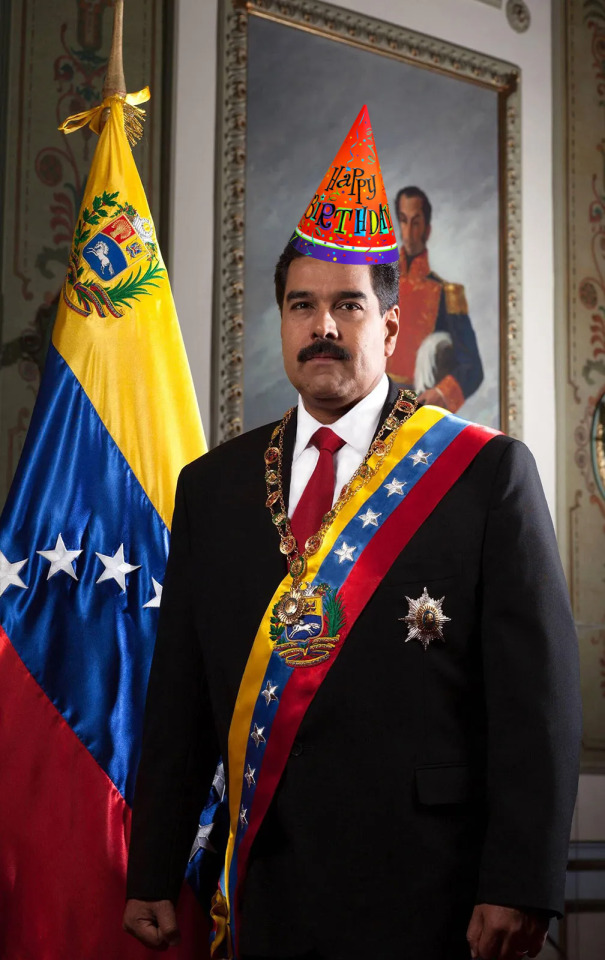
Happy birthday, Nicolas Maduro! (November 23, 1962)
The current President of Venezuela and a onetime trade union leader, Nicolas Maduro was born in Caracas to a working class family with leftist sympathies. He worked for many years as a bus driver, which is when he became active in trade unionism. He was an early political ally of Hugo Chavez, playing a leading role in the Fifth Republic Movement which carried Chavez to the Venezuelan Presidency at the close of the 20th Century. Maduro played a variety of roles in Chavez' government until becoming his final Vice President, a role which led him to becoming President after Chavez' death and a subsequent election. In office, Maduro has led Venezuela through a coup attempt by the United States and taken a leading role in the regional left.
"Should Latin America and the Caribbean accept these methods that so hurt our region in the entire 20th century? How many military interventions? How many coup d’états? How many dictatorships were imposed during the long and dark 20th century in Latin America and the Caribbean, and who did it favor? Did it favor the Peoples? What interests did they represent? The interests of the transnational companies, the unpopular interests; long dictatorships, like Augusto Pinochet’s in Chile, were faced by our peoples due to the stubbornness of the American elites."
105 notes
·
View notes
Text
Brazil's Lula, Venezuela's Maduro embrace 'new era' in ties
Venezuelan leader Nicolas Maduro met with leftist Brazilian President Lula ahead of a regional summit in Brasilia. Lula's conservative predecessor, Jair Bolsonaro, had previously banned Maduro from entering Brazil.
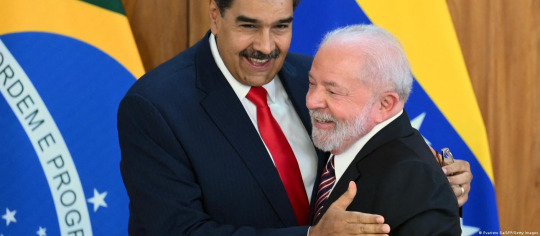
Brazilian President Luiz Inacio Lula da Silva met his Venezuelan counterpart Nicolas Maduro on Monday and called out US sanctions against Venezuela as "extremely exaggerated."
Maduro, who is seen as a controversial leader internationally, met Lula on his visit to Brazil. Maduro was greeted by Lula with a hug and back-slap in the presidential palace of Brasilia.
The Venezuelan leader was invited by Lula to attend a South American leaders' summit that will be held on Tuesday to discuss the revival of the Union of South American Nations (UNASUR).
Lula criticized the US for denying legitimacy to Maduro's socialist government, which is viewed by Washington as authoritarian for alleged human rights violations.
Lula chided the US over denial of legitimacy to Maduro's government and the "900 sanctions" Venezuela faces.
Continue reading.
#brazil#venezuela#politics#brazilian politics#venezuelan politics#luiz inacio lula da silva#nicolas maduro#international politics#foreign policy#mod nise da silveira#image description in alt
242 notes
·
View notes
Text
Guayana Esequiba and Why It Matters
So, I do not usually make statements like these considering my blog is mainly fandom but I felt like I need to.
If you do not know, I am Guyanese of African descent. My parents are Guyanese immigrants, born shortly after the country gained independence. Most of my family came from Guyana. I am very proud of being Guyanese and I can say that it is a part of who I am.
Before I go further, whenever I say Venezuela, I am primarily talking about the Venezuelan government and Nicolas Maduro, NOT the Venezuelan people who had to suffer this. Just saying this before anyone accuses me of being a racist.
Now, if you have been looking at the news, you saw that Venezuela had a referendum to annex the Esequibo region, which is a region that is west of the Esequibo River in Guyana. That region takes up at least two-thirds of Guyana. This region has been disputed since the colonial era, mainly between Spain and the British Empire. This continued when Venezuela and Guyana gained their independence. In the present, Guyana has been having rapid economic growth since it discovered oil as Venezuela went downhill since Maduro got power. The latter had been suffering from hyperinflation, high poverty levels, and food shortages. So much so that some of them had to leave for Guyana from the west. This led to tensions between them and the Guyanese and that's putting it lightly.
As Guyana discovered oil on their territorial water, Venezuela wanted it. So they decided to seize it by stating that the Esequibo region belonged to them, despite it being clear that it belonged to Guyana. ExxonMobil already made deals with Guyana to get the oil. I know how people will say that ExxonMobil is greedy, which I do not disagree with, but be aware that GUYANA is the one who has the right to those waters and made a deal with them. Plus, people should not make the argument that Guyana should have a meeting with Venezuela about THEIR OWN SOVEREIGN TERRITORY. It does not make sense because the Esequibo Region has been established to be a part of Guyana since its creation. This is the same logic where people believe that Ukraine should be in talks with Russia about the territory that the latter STOLE with invasions and rigged elections.
Not to mention that the Guyanese government was in talks for years to resolve this diplomatically.
There is no legitimate reason to further invade or annex a country. It was bad when the US took over Iraq. It was bad when Russia took over Crimea and Ukraine's eastern regions. Now, it is bad that Venezuela is planning to annex about 66% of Guyana.
Do you think that they would stop there? I doubt the rest of South America believes that.
The People of Guyana are not giving up one blade of grass. Spread the word.

75 notes
·
View notes
Note
Did you see that Biden said it would be "a huge mistake" for Israel to occupy the Gaza Strip?
According to Middle East Eye: https://www.instagram.com/p/CycHSCHIzhg/?igshid=MzRlODBiNWFlZA==
I'm not sure if he's backtracking on his own insistence on a ground invasion because he knows it's doomed or if he's trying to repair his own tarnished image after literally spreading fake news and war mongering propaganda over the past week, but it's so pathetic
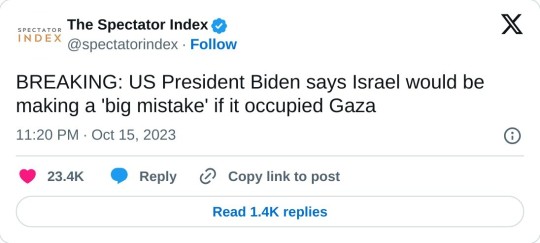
It's been obvious for a while that the Biden administration knows a ground invasion will go badly for Israel. At the very least, it will lead to a regional war and it might even unite all of West Asia against a common enemy - America.
You know, I've posted about how Israel isn't behaving strategically. They're just bombing Gaza without causing damage to or even slowing down Palestinian militia groups but America also has the same issue. It's trying to prevent a regional war by speaking to Iran while also asking Israel to slow down because the bombing of Gaza is losing Israel a lot of good will
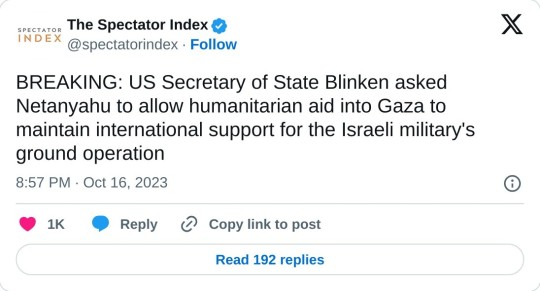
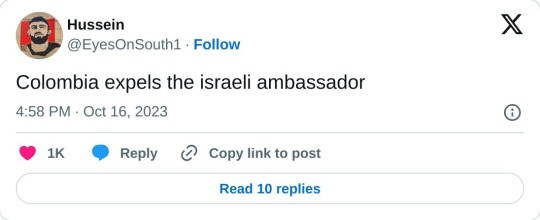
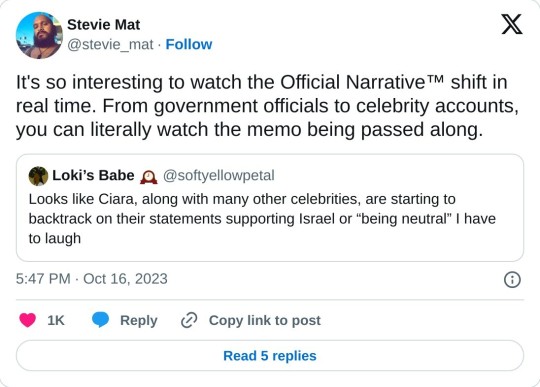
However, America is also doing things like this
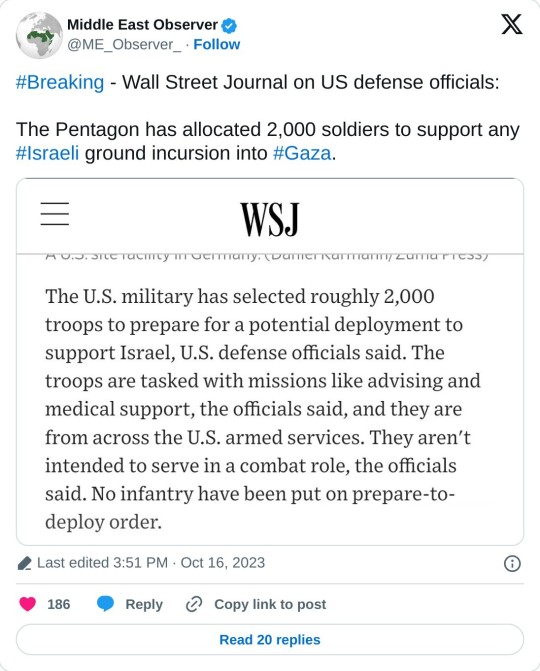
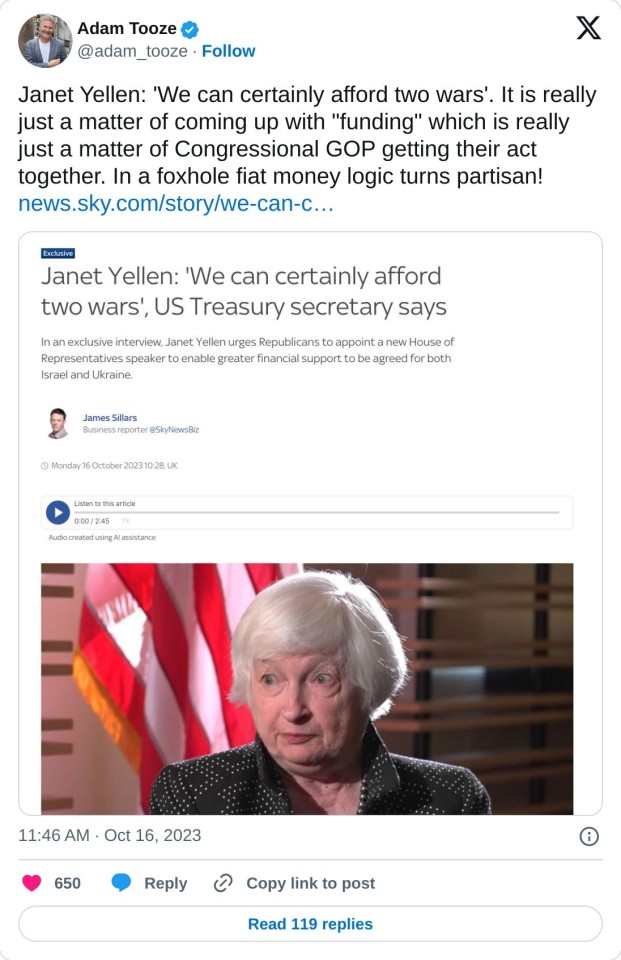
Does America support a ground invasion or not? It looks like they know it's a bad idea but they're willing to support Israel by sending soldiers (which would trigger a regional war) even though there are people in the government that know it's a terrible strategy
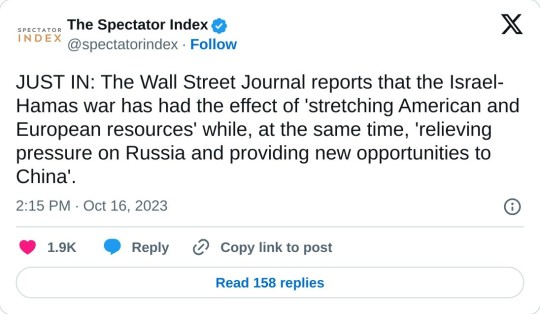
They're also easing sanctions in Venezuela which is a big deal because it means they need Venezuelan oil since it might be harder in the coming months to get oil from West Asia if there's a regional war. They did this when the Russia-Ukraine war started and they were trying to stop countries from buying Russian gas.
I saw someone say that there are different factions within the administration which would explain a lot of things, like why they keep going back forth between escalating and calling for restrait (without using the word restrait of course).
Personally, I think it's because internal polling likely shows that Americans aren't interested in another expensive war after Biden sent tens of billions to Ukraine
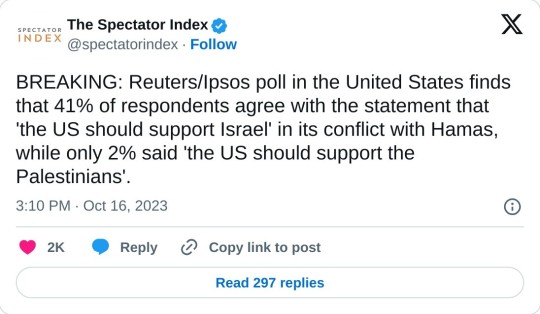
So, they can't exactly afford to go all in on the ground invasion of Gaza and the subsequent regional war that will follow. At least not without first trying to change the public's perception.
193 notes
·
View notes
Text
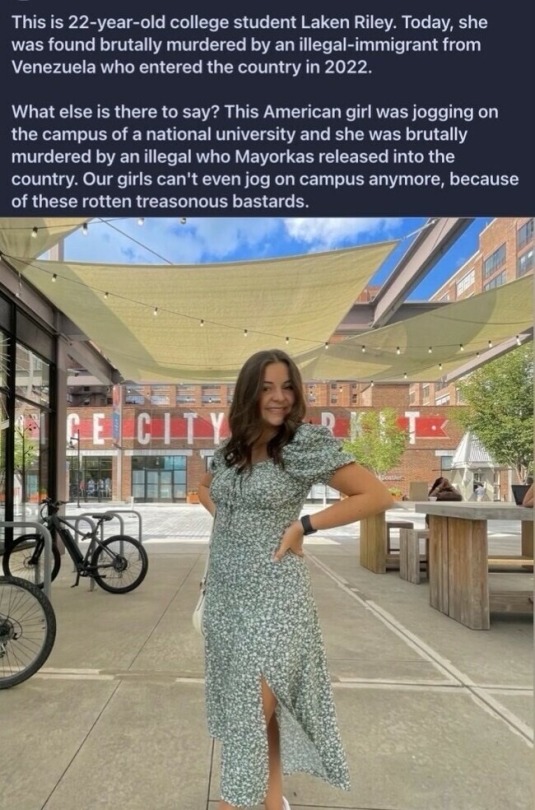
The blood of Laken Riley is on the hands of Joe Biden, Alejandro Mayorkas, and the government of Athens-Clarke County. The Venezuelan suspect in Laken Riley’s murder is one of millions of illegal aliens that the Biden administration has released into this country to be welcomed with open arms by Democrat-run sanctuary jurisdictions. This man had no business being in America, much less the UGA community to brutally murder this young American while she was on a run. To put this in simpler terms: if this border was secure, and Athens not a sanctuary city, Laken Riley would be alive. She would still be talking to her family, hanging out with friends, studying to be a nurse, and working toward serving her community and saving the lives of others. Instead, she is dead because the people who took an oath to preserve our Constitution and faithfully execute our laws refuse to do so because they think it benefits them politically. If the leaders responsible for this have any honor they will resign. If they don’t, the people need to remove them. ~ Rep. Mike Collins
The murder of Laken Riley will be silenced by MSM and big tech because they can not afford bad PR to The Party. How many Laken Riley’s will be enough for voters to take notice what Biden is doing?
RIP Laken Riley ❤️🙏❤️
35 notes
·
View notes
Text
ultimately my perspective on venezuelan politics can be summarized with two tenets:
#1: unlimited solidarity with the maduro government, against western imperialism and the murderous sanctions regime and all their wannabe-comprador puppets in the mainstream opposition
#2: unlimited solidarity with the indigenous peoples of venezuela, with striking workers who have seen paycuts, with the PCV and the movimiento tupamaro, and all other genuinely progressive forces that have been betrayed and suppressed, against the maduro government
244 notes
·
View notes
Text

Shoot: The Rake Magazine, October 2016, Issue 48
Photographer: Anders Overgaard
Interviewer: Tom Chamberlin
Grooming: Jessica Ortiz
Full interview, behind the scenes, outtakes & shoot photographs below. 👇🏻
Jett's Pedro's Shoots Masterlist
• Cover shot and original images used in the magazine
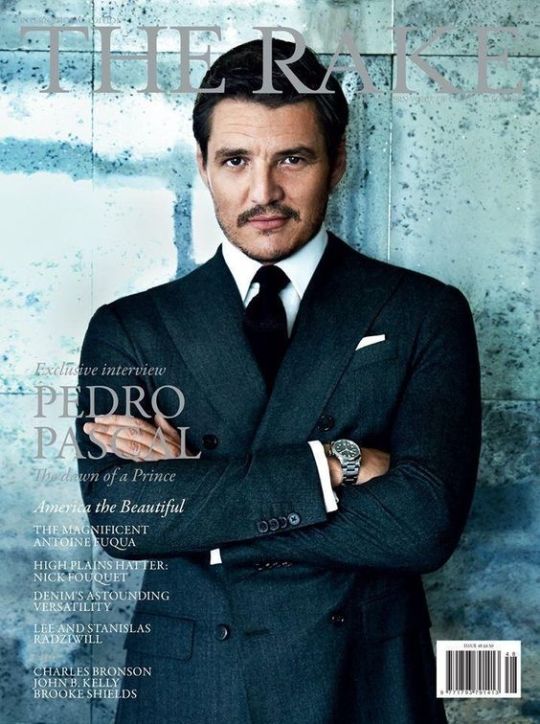
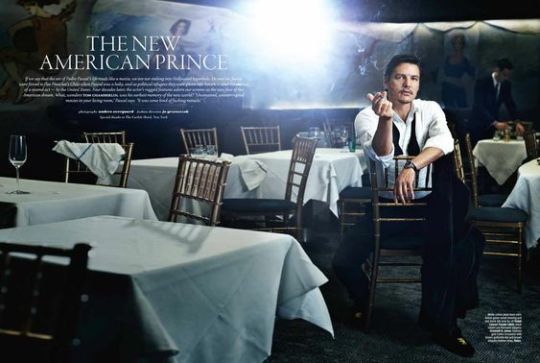

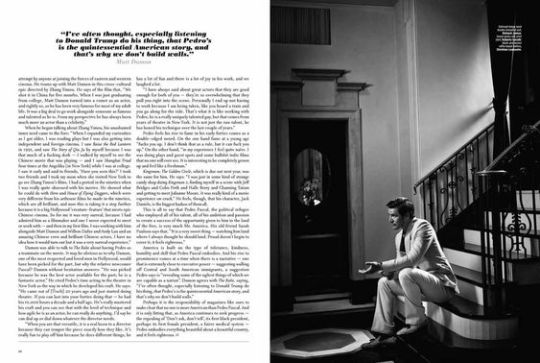
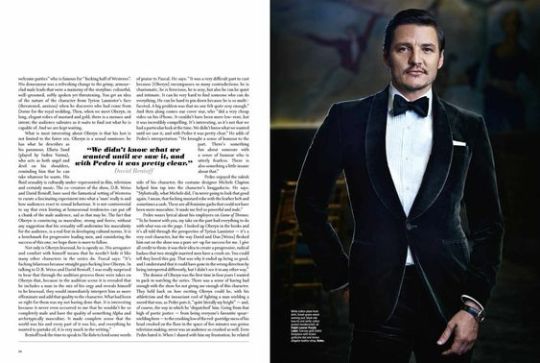
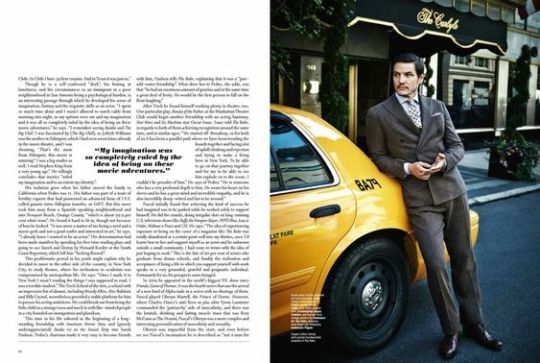
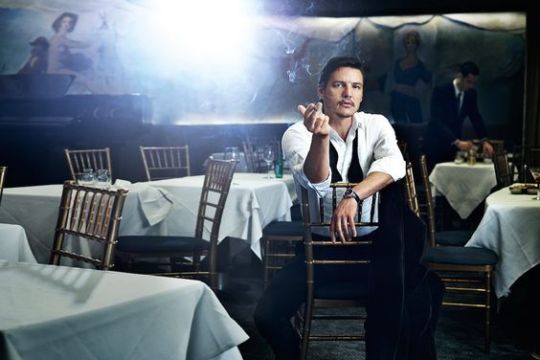
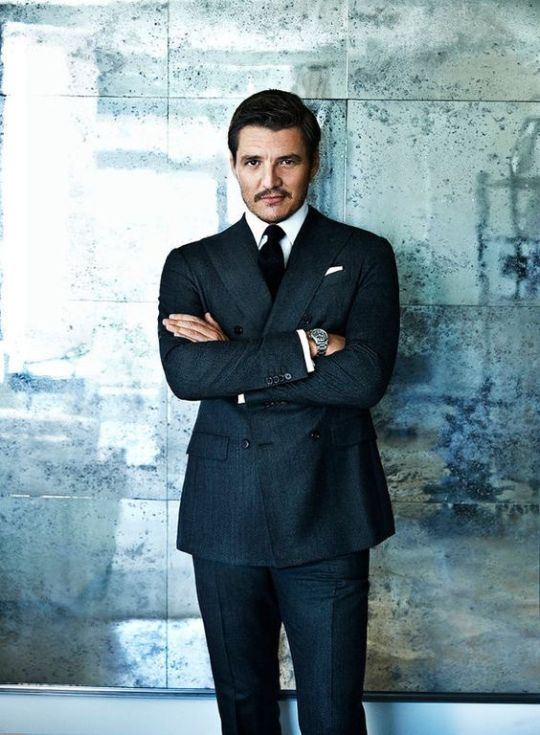
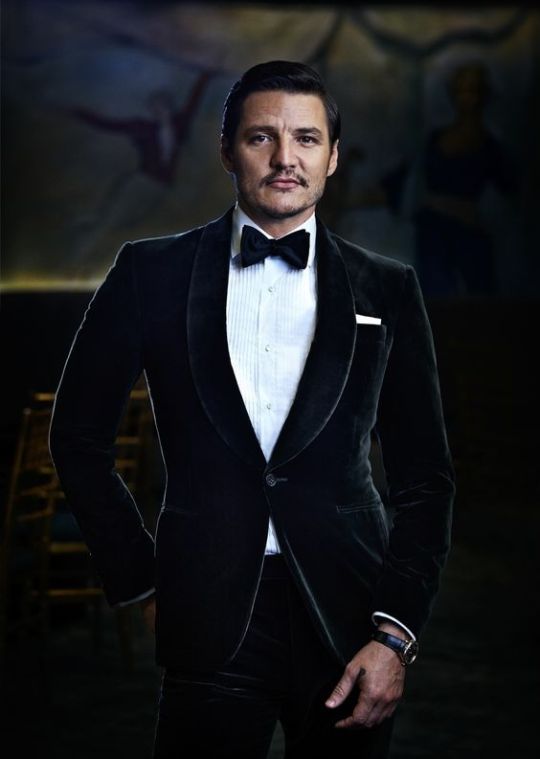



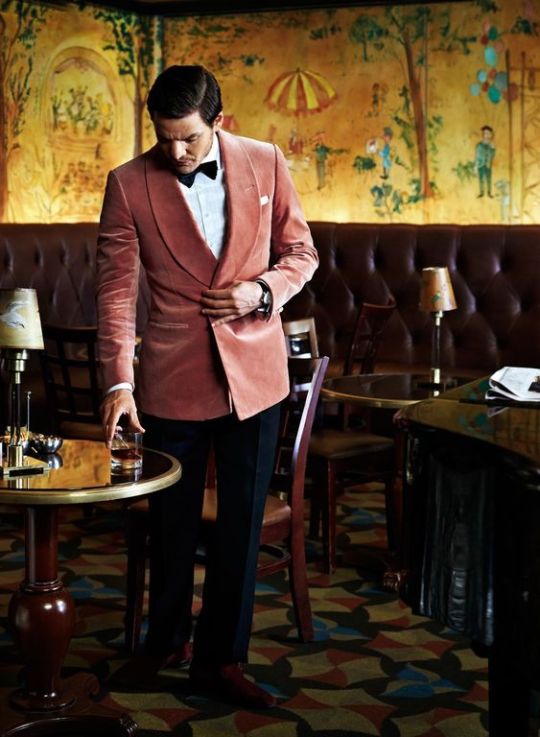
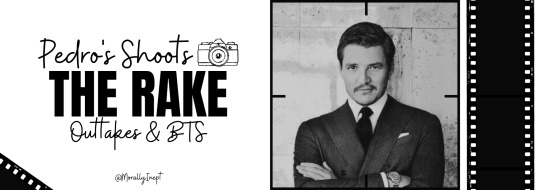
• Outtakes and behind the scenes images.
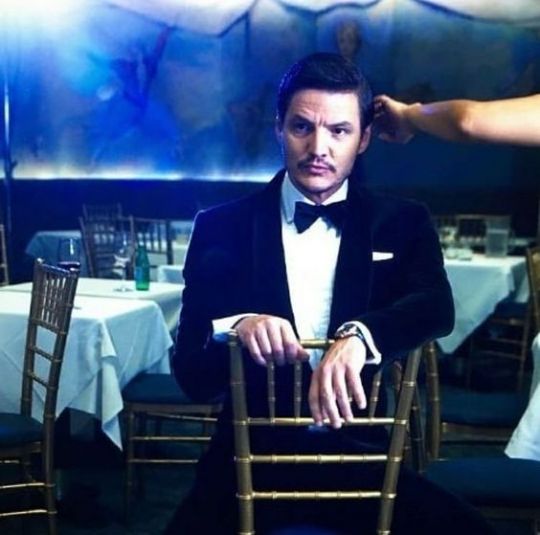
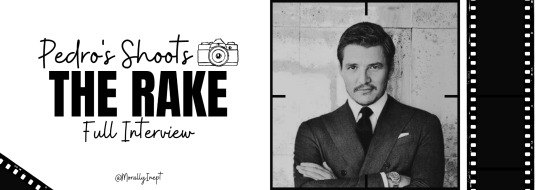
• Full Interview
As a stickler for timing, it was a tad disconcerting for me that half an hour into an hour-long interview, Pedro Pascal was still barely a year old. The family history of this actor is a story in itself, one that Pedro intends to write one day.
Happily, Pedro was very generous with his time, and, as with our photoshoot at The Carlyle Hotel in New York, and with every role he has played, he understands the difference between a hash-job and a job well done. Perhaps this is why Pedro will be on screen pretty much non-stop for the next year and is fast building an enviable C.V.
His roles as a protagonist span big-budget Hollywood movies and the finer works of subscription television, namely Game of Thrones and Narcos, whose second series is currently available on Netflix. It turns out he is also the epitome of America: an immigrant who has taken his talent and ambition and made a success of himself in a country that takes people in and gives them a chance to succeed. And The Rake was given the opportunity of an in-depth discussion with this star player.
I should firstly elaborate on the extraordinary tale of his early life. His family name is Balmaceda, his father is a doctor, and his late mother (whose maiden name was Pascal) welcomed José Pedro Balmaceda Pascal into the world on April 2, 1975 in Santiago, Chile. Those of you familiar with the South American governments of the time will know that this was not a simple epoch in which to be born in Chile. It was less than two years since Augusto Pinochet had deposed Salvador Allende, the first democratically elected head of state in Chile, in a coup d’état. Allende killed himself in the coup but his supporters remained a thorn in the junta’s side. So, as any self-respecting dictator would, Pinochet found opposition members, rounded them up, and tortured them for information on other dissenters who could be found, rounded up, and so on.
One such occasion was some years later, when our cover star enters the fray. A cousin of Pascal’s mother was Andrés Pascal Allende, a powerful revolutionary and supporter of his uncle. One day, during a gunfight, this freedom fighter would be given medical aid and shelter chez Balmaceda, and it would be this gesture that put the family on the ‘list’. Pedro recalls (through no memory of his own but that of his father’s) that, “the Pascal family wasn’t particularly safe." He adds: “There was a priest who was brought [Andrés], who had been shot in the leg, to my mum and dad’s house. My father took him in, hid them for a few days, and patched up his leg. I was a baby, my sister was just three, and she says she has a vague memory of being really angry that our parents had put strangers’shit in her bedroom, including guns and stuff.”
The innocence of youth! But the story becomes more and more like a Bourne movie: “The priest was taken into custody and tortured; he gave names, and they went looking for my father at the hospital he worked at. By chance it got to him that they were downstairs, asking where to find Dr. José Balmaceda. My father sneaks out the back and gets my mum, his sister gets my sister and me. They work out that their only option is to go into hiding, which they do for about six months, and they end up sneaking into the Venezuelan embassy and sought asylum.”
You can see why we spent so long on the subject. His light-hearted approach to talking about this may be because he was too young (about nine months old when they came out of hiding) to have been affected by the process, but there is pride in his parents’ actions, the way in which they carried him and his sister to safety in a climate in which even children were not safe. The solution wasn’t ‘doing an Assange’ and locking themselves in the embassy - they had to leave.
Though they would ultimately settle in the United States, it was Denmark that took them in first. Pascal was still too young to recall a great deal; after a year his father was contacted by a Chilean professor in San Antonio, Texas, and was offered a job. San Antonio was a great place for South American immigrants. With a large Spanish-speaking population, it wasn’t as much of a departure, or culture shock, for the family as Denmark had been.
They lived there until 1986, and it was during this time that he developed a love of movies and the desire to become an actor. He says of that time: “Strangely it was my father’s fault, because he was a huge moviegoer and he would take us to the movies a few times a week throughout my childhood. Of course, we got cable television and HBO came into the fold. Uncensored, uninterrupted movies in your living room: it was some kind of fucking miracle. I remember sitting there and it feeling like absolute magic to me. I remember perfectly watching my first movie on HBO and thinking it was magic.”
While television was developing its appeal, cinema was the family craze, and his father was the most zealous disciple. Pascal adds: “I am telling you, we would go several times a week. And it wouldn’t matter, if my dad wanted to see a movie, and there wasn’t a babysitter, we would go with him or he’d just want to take us. It is my father and Steven Spielberg’s fault - Spielberg being the ruling aesthetic of Hollywood at that time. Throw MTV and Nickelodeon into the mix, and public school systems in San Antonio and very cool parents - these were socialising us and forming us. It is in such stark contrast to what it would be in Chile. In Chile I have 34 first cousins. And in Texas it was just us.”
Though he is a self-confessed “dork”, his hinting at loneliness, and his circumstances as an immigrant in a poor neighbourhood in San Antonio being a psychological burden, is an interesting passage through which he developed his sense of imagination, fantasy and the requisite skills as an actor. “I spent so much time alone and I wasn’t allowed to watch cable from morning into night, so my options were me and my imagination and it was all so completely ruled by the idea of being on these movie adventures,” he says. “I remember seeing Rambo and The Big Chill. I was fascinated by [The Big Chill], as JoBeth Williams was the mother in Poltergeist, which I had seen seven times already in the movie theatre, and I was shouting, ‘That’s the mum from Poltergeist, this movie is amazing!’ I was a big reader as well. I read Stephen King from a very young age.” He tellingly concludes that movies “ruled my imagination and to an extent my identity."
His isolation grew when his father moved the family to California when Pedro was 11. His father was part of a team of fertility experts that had pioneered an advanced form of I.V.F. called gamete intra-fallopian transfer, or GIFT. But this move took him away from a Spanish-speaking neighbourhood and into Newport Beach, Orange County, “which is about a 99.9 per cent white town." He found it hard to fit in, though not because of how he looked. “It was more a matter of me being a nerd and a movie geek and not a good surfer and interested in art,” he says. “I already knew I wanted to be an actor.” His determination had been made manifest by spending his free time reading plays and going to see Search and Destroy by Howard Korder at the South Coast Repertory, which left him “fucking floored."
This problematic period in his youth might explain why he decided to move to the other side of the country, to New York City, to study theatre, where his inclination to academia was compromised by metropolitan life. He says: “Once I made it to New York I wasn’t reading the things I was supposed to read. I was a terrible student.” The Tisch School of the Arts, a school with an impressive list of alumni, including Woody Allen, Alec Baldwin and Billy Crystal, nevertheless provided a stable platform for him to pursue his acting ambitions. He could break out from being the little child in a strange town and muck in with like-minded people in a city founded on immigration and pluralism.
This time in his life ushered in the beginning of a long-standing friendship with American Horror Story and (gravely underappreciated) Studio 60 on the Sunset Strip star Sarah Paulson. Pedro’s charisma made it very easy to become friends with him, Paulson tells The Rake, explaining that it was a “just-add-water friendship." What drew her to Pedro, she adds, was that “he had an enormous amount of gravitas and at the same time a great deal of levity. He would be the first person to fall on the floor laughing.”
After Tisch he found himself working plenty in theatre, too. One particular play, Beauty of the Father, at the Manhattan Theatre Club would begin another friendship with an acting luminary, Star Wars and Ex Machina star Oscar Isaac. Isaac told The Rake, in regards to both of them achieving recognition around the same time and at similar ages: “We started off-Broadway, so for both of us it has been a parallel path where we have been treading the boards together and facing a lot of uphill climbing and rejection and trying to make a living here in New York. To be able to go on that journey together and for me to be able to see him explode on to the scene, I couldn’t be prouder of him.” He says of Pedro: “He is someone who has a very profound depth to him. He wears his heart on his sleeve and he has a great mind and incredible empathy, and he is also incredibly sharp-witted and fun to be around.”
Pascal would find that achieving the kind of success he had imagined was to be parked while he worked solely to support himself. He did the rounds, doing irregular slots on long-running U.S. television shows like Buffy the Vampire Slayer, NYPD Blue, Law & Order, Without a Trace and CSI. He says: “The idea of experiencing exposure or being on the cover of a magazine like The Rake was totally abandoned at a certain point well into my thirties, once I’d learnt how to live and support myself as an actor and be unknown outside a small community. I had come to terms with the idea of just hoping to work.” This is the fate of 90 per cent of actors who graduate from drama schools, and frankly the realisation and acceptance of living a life in which you support yourself with work speaks to a very grounded, grateful and pragmatic individual.
Fortunately for us, his prospects soon changed.
In 2014 he appeared in the world’s biggest T.V. show since Friends, Game of Thrones. It was the fourth series that saw the arrival of a new kind of Alpha male in a series with no shortage of them. Pascal played Oberyn Martell, the Prince of Dorne. However, where Charles Dance’s anti-hero ne plus ultra Tywin Lannister commanded the ‘patriarchy’ side of masculinity, and there was the brutish, drinking and farting muscle mass that was Rory McCann as The Hound, Pascal’s Oberyn was a more complex and interesting personification of masculinity and sexuality. Oberyn was affecting from the start, and even before we see Pascal’s incarnation he is described as “not a man for welcome parties” who is famous for “fucking half of Westeros."
His demeanour was a refreshing change to the grimy, armour-clad male leads that were a mainstay of the storyline: colourful, well-groomed, softly spoken yet threatening. You get an idea of the nature of the character from Tyrion Lannister’s face (threatened, anxious) when he discovers who had come from Dorne for the royal wedding. Then, when we meet Oberyn, in long, elegant robes of mustard and gold, there is a menace and intent; the audience salivates as it waits to find out what he is capable of. And we are kept waiting. What is most interesting about Oberyn is that his lust is not limited to the fairer sex. Oberyn is a sexual omnivore: he has what he describes as his paramour, Ellaria Sand (played by Indira Varma), who acts as both angel and devil on his shoulders, reminding him that he can take whatever he wants.
His fluid sexuality is culturally under-represented in film, television and certainly music. The co-creators of the show, D.B. Weiss and David Benioff, have used the fantastical setting of Westeros to curate a fascinating experiment into what a ‘man’ really is and how audiences react to sexual behaviour. It is not controversial to say that even hinting at homosexual tendencies can put off a chunk of the male audience, sad as that may be. The fact that Oberyn is convincing as masculine, strong and fierce, without any suggestion that his sexuality will undermine his masculinity for the audience, is a real feat in developing cultural norms. It is a benchmark for progressive leading men, and considering the success of this one, we hope there is more to follow.
Not only is Oberyn bisexual, he is openly so. His arrogance and comfort with himself means that he needn’t hide it like many other characters in the series do. Pascal says: “It’s fucking hilarious because straight guys fucking love Oberyn. In talking to D.B. Weiss and David Benioff, I was really surprised to hear that through the audition process there were takes on Oberyn that, because in the audition scene it is revealed that he includes a man in the mix of his orgy and reveals himself to be bisexual, they would immediately interpret him as more effeminate and add that quality to the character. What had been so right for them was my not having done that. It is interesting because it never even occurred to me that he wouldn’t be so completely male and have the quality of something Alpha and archetypically masculine. It made complete sense that the world was his and every part of it was his, and everything he wanted to partake of, it is very much in the writing.”
Benioff took the time to speak to The Rake to lend some words of praise to Pascal. He says: “It was a very difficult part to cast because [Oberyn] encompasses so many contradictions: he is charismatic, he is ferocious, he is sexy, but also he can be quiet and intimate. It can be very hard to find someone who can do everything. He can be hard to pin down because he is so multi- faceted. A big problem was that no one felt quite sexy enough.”
And then along comes our cover star, who “did a very cheap video on his iPhone. It couldn’t have been more low-rent, but it was incredibly compelling. It’s interesting, as it’s not that we had a particular look at the time. We didn’t know what we wanted until we saw it, and with Pedro it was pretty clear.” He adds of Pedro’s interpretation: “He brought a sense of humour to the part. There’s something fun about someone with a sense of humour who is utterly fearless. There is also something a little insane about that.”
Pedro enjoyed the rakish side of his character; the costume designer Michele Clapton helped him tap into the character’s braggadocio. He says: “Stylistically, what Michele did, I’m never going to look that good again. I mean, that fucking mustard robe with the leather belt and sometimes a sash. These are all feminine garbs that could not have been more masculine. It made me feel so powerful and male.”
Pedro waxes lyrical about his employers on Game of Thrones: “To be honest with you, my take on the part had everything to do with what was on the page. I looked up Oberyn in the books and it’s all told through the perspective of Tyrion Lannister - it’s a very cool character, but the way David and Dan [Weiss] fleshed him out on the show was a pure set-up for success for me. I give all credit to them: it was their idea to create a progressive, radical badass that two straight married men have a crush on. You could tell they loved this guy. That was why it ended up being so good, and I understand that it could have gone in the wrong direction by being interpreted differently, but I didn’t see it in any other way.”
The demise of Oberyn was the first time in four years I wanted to pack in watching the series. There was a sense of having had enough with the show for not giving me enough of this character. They held back on how exciting Oberyn could be, with his athleticism and the insouciant cool of fighting a man wielding a sword that was, as Pedro puts it, “quite literally my height” - and, of course, the way in which he ‘dispatched’ him. Going from that high of poetic justice - from being everyone’s favourite spear-wielding hero - to the crushing low of the red-porridge mess of his head crushed on the floor in the space of five minutes was genius television making; never was an audience so crushed as well.
Even Pedro hated it.
When I shared with him my frustration, he related by saying: “Yes, because it feels terrible. Why should I go to bed with this horrific feeling in my heart? I love that people felt that way about Oberyn because I had felt that way about the Red Wedding (a shocking scene in which several major characters were killed off at a wedding feast). I almost stopped. I was in the process of auditioning for Oberyn and I had already had my heart crushed. I remember thinking very specifically, ‘Soon it’s time for bed and I’m in a place of such darkness because of watching television - this isn’t good for me’.”
Fortunately, Pascal’s particular brand of bravura masculinity returned in 2015 with Narcos, Netflix’s true events epic about Pablo Escobar and the rise of the Colombian drug trade. It is a show The Economist describes as “doing a better job than most narco-dramas in getting across the brutal seediness of the drugs business.” Pascal plays Javier Peña, a man who isn’t afraid to break a few eggs to make his omelette, a man very much part of the aforementioned brutal seediness.
In an era in which scrutiny of our institutions is critical, a show set in a time when there was plenty brushed under the carpet conducts an interesting moral waltz with the audience’s empathy. Pedro says: “I don’t see him as moral. I see him as pragmatic and work obsessed. It is all due credit to the creators of the show, who allow me to interpret the character in the most interesting way possible. I love that Peña and the writers of Narcos and Netflix are totally game for him being a character who exists more ambiguously and represents the greyer elements of this drugs war that the U.S. gets involved with. I think he, as a character, is definitely wanting to get the job done however he sees fit, and this is a guy who never got married, who never had attachments, who could easily disappear into this world with nothing to lose, and I think that’s what makes him good at it and helps him achieve some of his objectives - because he can assimilate, he can participate, he can get on the inside culturally and psychologically, and be totally badass, of course.”
He has plenty more to do in the second series, so the challenge for Pascal is to elevate the performance and not leave it still and stagnant, a challenge he revels in. He says: “I feel like, in a way, the first season is, in terms of the character, somewhat of an introduction and opens up the opportunity to see more in the second season. When you meet him he’s already on the inside, he’s having sex with a gorgeous prostitute who he has this strange relationship to: they are lovers, she’s his informant, they are friends, and we don’t get that many private adventures of Peña in the first season. I would say in the second series there is more opportunity to spend a little more time with that character, so it almost feels like season one and season two is a two-act play, and in the second act Peña has more to do.”
Now, as expected, momentum is very much in Pedro’s favour. Next year will be a big year for him. We have seen a trailer for his first feature film, The Great Wall, the first attempt by anyone at joining the forces of eastern and western cinema. He teams up with Matt Damon in this cross-cultural epic directed by Zhang Yimou. He says of the film that, “We shot it in China for five months. When I was just graduating from college, Matt Damon turned into a comet as an actor, and rightly so, so he has been very famous for most of my adult life. It was a big deal to go work alongside someone as famous and talented as he is. From my perspective he has always been much more an actor than a celebrity.”
When he began talking about Zhang Yimou, his unashamed inner nerd came to the fore: “When I expanded my curiosities as I got older, I was reading plays but I was also getting into independent and foreign cinema. I saw Raise the Red Lantern in 1991, and saw The Story of Qiu Ju by myself because I was that much of a fucking dork - I walked by myself to see the Chinese movie that was playing - and I saw Shanghai Triad four times at the Angelika [in New York] while I was at college. I saw it early and said to friends, ‘Have you seen this?’ I took two friends and I took my mom when she visited New York to go see Zhang Yimou’s films. I had a period in the nineties when I was really quite obsessed with his movies. He showed what he could do with Hero and House of Flying Daggers, which were very different from his arthouse films he made in the nineties, which are all brilliant, and now this is taking it a step further because it is a big Hollywood ‘creature-feature’ that meets epic Chinese cinema. So for me it was very surreal, because I had admired him as a filmmaker and one I never expected to meet or work with - and then in my first film. I was working with him alongside Matt Damon and Willem Dafoe and Andy Lau and an amazing Chinese crew and brilliant Chinese actors. I had no idea how it would turn out but it was a very surreal experience.”
Damon was able to talk to The Rake about having Pedro as a teammate on the movie. It may be obvious as to why Damon, one of the most respected and loved men in Hollywood, would have been picked for the part, but why the relative newcomer Pascal? Damon without hesitation answers: “He was picked because he was the best actor available for the part; he is a fantastic actor.” He cited Pedro’s time acting in the theatre in New York as the way in which he developed his craft. He says: “He came out of [Tisch] 20 years ago and just started doing theatre. If you can last into your forties doing that - he had his 10,000 hours a decade and a half ago. He’s really mastered his craft and you can see that with the level of technique and how agile he is as an actor, he can really do anything. I’d say he can dial up or dial down whatever the director needs. When you are that versatile, it is a real boon to a director because they can temper the piece exactly how they like. It’s really fun to play off him because he does different things, he has a lot of fun and there is a lot of joy in his work, and we laughed a lot. I have always said about great actors that they are good enough for both of you - they’re so overwhelming that they pull you right into the scene. Personally I end up not having to work because I am being taken, like you board a train and you go along for the ride. That’s what it is like working with Pedro, he is a really uniquely talented guy, but that comes from years of theatre in New York. It is not just the raw talent, he has honed his technique over the last couple of years.”
Pedro feels his rise to fame in his early forties comes as a double-edged sword. On the one hand fame at a young age “fucks you up. I don’t think that as a rule, but it can fuck you up.” On the other hand, “in my experience I feel quite naïve. I was doing plays and guest spots and some bullshit indie films that no one will ever see. It is interesting to be completely grown up and feel like a freshman.”
Kingsman: The Golden Circle, which is due out next year, was the same for him. He says: “I was just in some kind of strange candy shop doing Kingsman 2, finding myself in a scene with Jeff Bridges and Colin Firth and Halle Berry and Channing Tatum and getting to meet Julianne Moore. It was really kind of a movie experience on crack." And reveals that Jack Daniels, is the biggest badass of them all.
This is all to say that Pedro Pascal, the political refugee who employed all of his talent, all of his ambition and passion to create a success of the opportunity given to him in the land of the free, is very much Mr. America. His old friend Sarah Paulson says that, “It is a very sweet thing - watching him land where I always thought he should land. Proud doesn’t begin to cover it; it feels righteous.”
America is built on the type of tolerance, kindness, humility and skill that Pedro Pascal embodies. And his rise to prominence comes at a time when there is a narrative - one that is extremely close to executive power - suggesting walling off Central and South American immigrants, a suggestion Pedro says is “revealing some of the ugliest things of which we are capable as a nation”. Damon agrees with The Rake, saying, “I’ve often thought, especially listening to Donald Trump do his thing, that Pedro’s is the quintessential American story, and that’s why we don’t build walls.”
Perhaps it is the responsibility of magazines like ours to make clear that no one is more American than Pedro Pascal. And it is only fitting that, as America continues to seek progress - the repealing of ‘Don’t ask, don’t tell’, its first black president, perhaps its first female president, a fairer medical system - Pedro embodies everything beautiful about a beautiful country, and it feels righteous.
Jett's Pedro's Shoots Masterlist
#pedro pascal#pedro pascal photoshoot#pedro pascal the rake#pedro pascal interview#jose pedro balmaceda pascal#pedro pascal photos#pedro pascal words#pedro pascal magazine
36 notes
·
View notes
Text
The Venezuelan authorities said on Thursday that they were seeking the arrest of Juan Guaidó, the former opposition leader who is in exile in the United States.[...]
[The Venezuelan Government] said Mr. Guaidó had used the resources of the state-owned oil company, Petróleos de Venezuela, for his own benefit, claiming that his actions had cost the Venezuelan government $19 billion.
6 Oct 23
101 notes
·
View notes